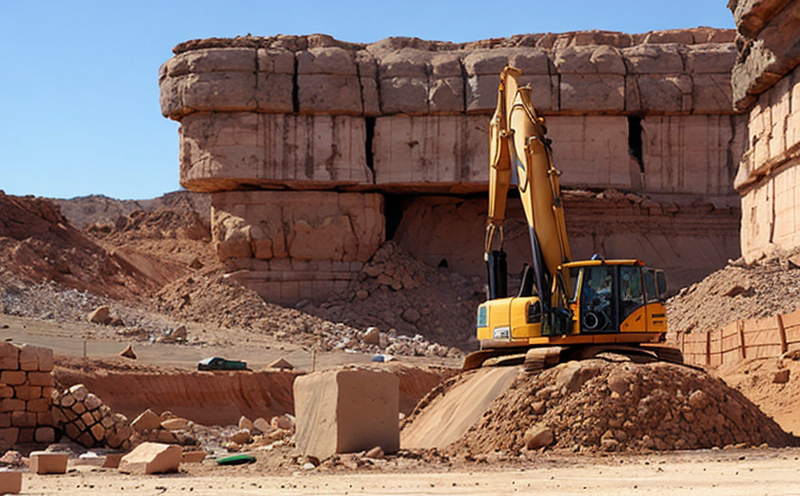ASTM D4644 Slake Durability of Shales and Weak Rocks Testing
The ASTM D4644 test method is designed specifically to evaluate the durability of shales and other weak rocks under conditions that simulate water-washing or slaking. This testing is crucial in geotechnical engineering, mining, and construction sectors where rock stability and integrity are paramount.
The test involves subjecting a sample of shale or weak rock to controlled water immersion for a specified period, followed by drying the sample. The primary goal is to assess how well the material holds its strength after undergoing this simulated weathering process. This information is invaluable in predicting the long-term performance and durability of materials used in infrastructure projects.
Shales and weak rocks are particularly susceptible to slaking due to their low cohesion and high porosity characteristics. Understanding these properties through ASTM D4644 testing can help engineers design more resilient structures, reduce maintenance costs, and enhance safety standards.
The test protocol requires precise specimen preparation, which involves cutting the rock into standard cylinders or cubes of a specified diameter and height. The specimens must then be dried to constant weight before undergoing water immersion in a controlled environment.
| Test Parameters | Description |
|---|---|
| Water Temperature | 25°C ± 1°C for 4 hours |
| Drying Conditions | 105°C ± 3°C until constant weight |
| Immersion Time | 28 days, or as specified by the project requirements |
| Dry Weighing | After complete drying to determine mass loss due to slaking |
The test results are reported based on the percentage change in mass of the specimen after undergoing the slaking process. A lower percentage indicates better durability and resistance to slaking, which is critical for selecting appropriate materials for projects.
This testing method is particularly important in regions with high rainfall or areas where rock weathering can be a significant factor. By using ASTM D4644 testing, engineers and geologists can make informed decisions about the suitability of shales and weak rocks for various applications.
- Construction of dams and reservoirs
- Mine tunnel and shaft lining design
- Roadbed construction in mountainous regions
- Bridge foundations
The test results are not only valuable for material selection but also provide insights into the potential impact of environmental factors on rock stability over time.
Why It Matters
The durability and strength properties of shales and weak rocks play a critical role in various industries, including mining, construction, and infrastructure. The ASTM D4644 test is essential for ensuring that materials used in these sectors can withstand the harsh environmental conditions they are likely to encounter.
Shales and weak rocks are often chosen due to their cost-effectiveness and availability. However, their susceptibility to slaking makes them a high-risk material choice unless tested with ASTM D4644. This testing ensures that materials can perform reliably under real-world conditions, reducing the likelihood of structural failures.
The test results also help in optimizing design parameters for structures such as tunnels, bridges, and foundations. By understanding how these rocks will behave over time, engineers can make more accurate predictions about maintenance needs and lifespan expectations. This leads to safer, more efficient infrastructure projects.
Additionally, the test contributes to sustainable development by ensuring that materials are used effectively and efficiently. By selecting durable rock types, resources are conserved, and waste generation is minimized.
Industry Applications
The ASTM D4644 test has broad applications in several industries where the durability of shales and weak rocks is critical. The most notable sectors are mining, construction, and infrastructure development.
| Application Sector | Specific Use Case |
|---|---|
| Mining | Tunnel lining design to withstand water ingress |
| Construction | Roadbed construction in mountainous regions with high rainfall |
| Infrastucture Development | Dam and reservoir construction to ensure stability against erosion |
In mining, the test is essential for designing tunnels and shafts that can withstand water pressure and prevent collapses. In roadbed construction, it helps in selecting materials that can endure frequent wetting and drying cycles without significant degradation.
For infrastructure development projects like dams and reservoirs, ensuring rock durability is crucial to prevent erosion and structural failure due to weathering. The test results provide valuable data for engineers to make informed decisions about material selection and design optimization.
Customer Impact and Satisfaction
The ASTM D4644 testing method significantly impacts customer satisfaction by ensuring that the materials used in critical infrastructure projects are reliable and long-lasting. This leads to cost savings through reduced maintenance and repair costs, as well as enhanced safety for workers and the public.
- Enhanced Safety: By selecting durable materials, risks associated with structural failures are minimized.
- Sustainable Development: Materials that pass this test are more efficient in terms of resource use and waste generation.
- Cost Efficiency: Longer-lasting materials reduce the frequency of maintenance and replacement, leading to lower operational costs.
- Regulatory Compliance: Ensures adherence to international standards like ASTM D4644, which is crucial for meeting regulatory requirements.
Customers who use this testing method can be confident that their projects will meet the highest quality and safety standards. This translates directly into improved customer satisfaction and trust in the services provided by laboratories offering this test.





